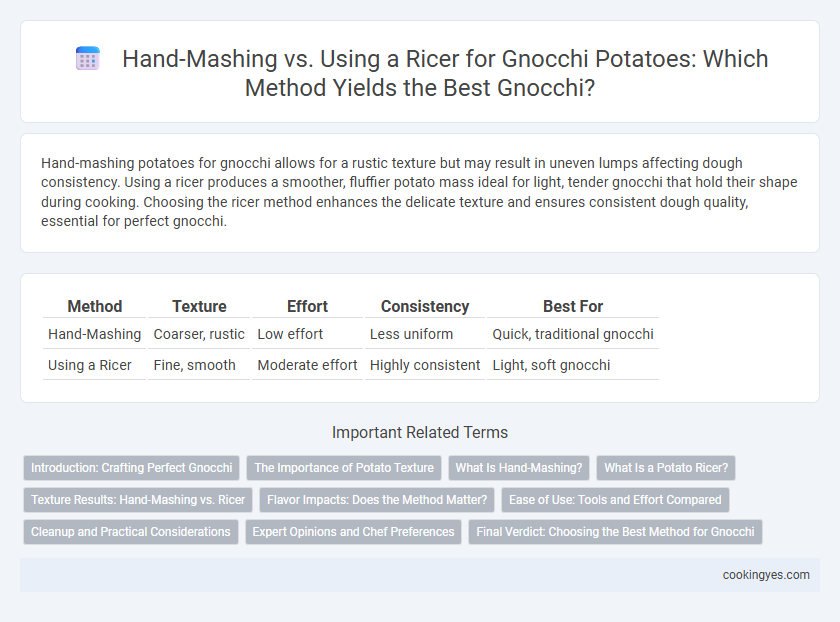Hand-mashing potatoes for gnocchi allows for a rustic texture but may result in uneven lumps affecting dough consistency. Using a ricer produces a smoother, fluffier potato mass ideal for light, tender gnocchi that hold their shape during cooking. Choosing the ricer method enhances the delicate texture and ensures consistent dough quality, essential for perfect gnocchi.
Table of Comparison
| Method | Texture | Effort | Consistency | Best For |
|---|---|---|---|---|
| Hand-Mashing | Coarser, rustic | Low effort | Less uniform | Quick, traditional gnocchi |
| Using a Ricer | Fine, smooth | Moderate effort | Highly consistent | Light, soft gnocchi |
Introduction: Crafting Perfect Gnocchi
Hand-mashing potatoes for gnocchi creates a rustic texture with slight variations that can enhance sauce absorption, while using a ricer produces uniformly smooth potatoes essential for light, fluffy gnocchi. The key to perfect gnocchi lies in handling the potatoes gently to avoid excess starch release, which can make the dough dense. Choosing between hand-mashing and a ricer affects the final gnocchi texture, with the ricer preferred by chefs seeking a delicate, melt-in-the-mouth consistency.
The Importance of Potato Texture
Achieving the perfect potato texture is crucial for delicate gnocchi, where hand-mashing allows controlled chunkiness to preserve some structure, enhancing bite and preventing gluey dough. Using a ricer creates a uniformly fine, light texture that minimizes lumps and avoids overworking the starch, resulting in tender, fluffy gnocchi. Prioritizing potato texture impacts dough elasticity and final gnocchi softness, with the choice between hand-mashing and ricers influencing moisture distribution and consistency.
What Is Hand-Mashing?
Hand-mashing potatoes for gnocchi involves using a fork or masher to manually break down cooked potatoes into a coarse, slightly textured consistency, preserving some small lumps for structure. This method allows for greater control over the texture, which can result in a denser dough that holds together well when rolled and cut. Compared to using a ricer, hand-mashing is less uniform but can enhance the rustic quality and flavor of traditional gnocchi.
What Is a Potato Ricer?
A potato ricer is a kitchen tool designed to press cooked potatoes through small holes, creating fine, fluffy strands that result in light and airy gnocchi dough. Unlike hand-mashing, which can leave lumps and overwork the starch, a ricer ensures uniform texture by gently breaking down the potatoes while minimizing moisture release. Using a potato ricer for gnocchi enhances dough consistency, contributing to tender, pillowy gnocchi with superior mouthfeel.
Texture Results: Hand-Mashing vs. Ricer
Hand-mashing potatoes for gnocchi often results in a coarser texture with occasional lumps, affecting the dough's smoothness and elasticity. Using a ricer produces finely textured, fluffy potato strands that create a lighter, more delicate gnocchi with consistent moisture distribution. The ricer method minimizes overworking the potatoes, preventing gluey dough and ensuring a tender final product.
Flavor Impacts: Does the Method Matter?
Hand-mashing potatoes for gnocchi retains more texture, which can enhance the rustic flavor and create a slightly denser bite, while using a ricer produces a finer, fluffier potato base that allows the dough to absorb flavors more uniformly. The method influences moisture content; hand-mashing may retain more starch and moisture, potentially impacting the final taste by intensifying the potato's natural sweetness. Chefs often prefer a ricer for consistent texture that highlights delicate ingredients and subtle seasonings in the gnocchi.
Ease of Use: Tools and Effort Compared
Hand-mashing potatoes for gnocchi requires more physical effort and can result in a denser texture due to uneven mashing. Using a ricer streamlines the process by producing consistently smooth and fluffy potato strands with minimal effort, enhancing dough quality. The ricer's design reduces strain on the hands, making it a preferred choice for ease of use and efficient gnocchi preparation.
Cleanup and Practical Considerations
Hand-mashing potatoes for gnocchi often results in a messier cleanup due to potato residue sticking to mashing tools and bowls, requiring thorough scrubbing. Using a ricer streamlines cleanup with its smooth surfaces and straightforward design, minimizing residue buildup and saving time. Practical considerations include the ricer's efficiency in producing uniform potato texture, which reduces preparation time and enhances the gnocchi's consistency.
Expert Opinions and Chef Preferences
Experts emphasize that hand-mashing potatoes for gnocchi preserves a slightly coarse texture, enhancing the dough's bite and preventing overworking. Chefs who prefer using a ricer highlight its ability to produce ultra-smooth, lump-free potatoes, ensuring a delicate, tender gnocchi consistency. The choice often hinges on balancing textural authenticity with ease of dough preparation, reflecting individual culinary philosophies.
Final Verdict: Choosing the Best Method for Gnocchi
Hand-mashing potatoes for gnocchi offers a rustic texture with slight variations, enhancing overall mouthfeel, while using a ricer results in a uniformly smooth and airy dough, key for light, tender pillows. The final verdict favors a ricer due to its ability to minimize lumps and incorporate less moisture, crucial for perfect dough consistency and preventing dense gnocchi. Home cooks aiming for delicate, professional-quality gnocchi benefit most from investing in a quality potato ricer.
Hand-mashing vs using a ricer for potatoes in gnocchi Infographic

 cookingyes.com
cookingyes.com